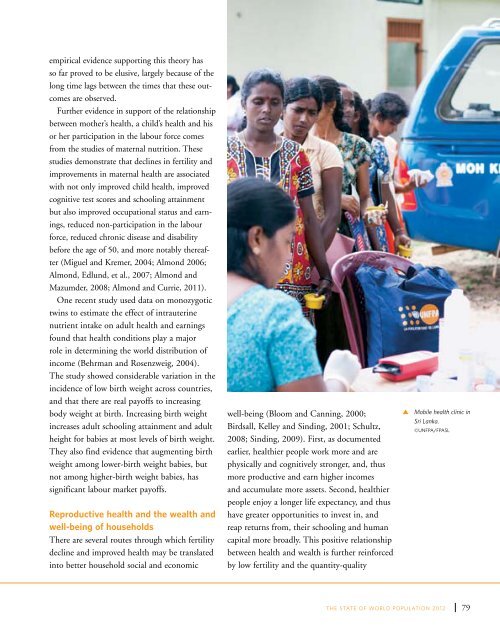State of World Population 2012 - Country Page List - UNFPA
State of World Population 2012 - Country Page List - UNFPA
State of World Population 2012 - Country Page List - UNFPA
Create successful ePaper yourself
Turn your PDF publications into a flip-book with our unique Google optimized e-Paper software.
empirical evidence supporting this theory has<br />
so far proved to be elusive, largely because <strong>of</strong> the<br />
long time lags between the times that these outcomes<br />
are observed.<br />
Further evidence in support <strong>of</strong> the relationship<br />
between mother’s health, a child’s health and his<br />
or her participation in the labour force comes<br />
from the studies <strong>of</strong> maternal nutrition. These<br />
studies demonstrate that declines in fertility and<br />
improvements in maternal health are associated<br />
with not only improved child health, improved<br />
cognitive test scores and schooling attainment<br />
but also improved occupational status and earnings,<br />
reduced non-participation in the labour<br />
force, reduced chronic disease and disability<br />
before the age <strong>of</strong> 50, and more notably thereafter<br />
(Miguel and Kremer, 2004; Almond 2006;<br />
Almond, Edlund, et al., 2007; Almond and<br />
Mazumder, 2008; Almond and Currie, 2011).<br />
One recent study used data on monozygotic<br />
twins to estimate the effect <strong>of</strong> intrauterine<br />
nutrient intake on adult health and earnings<br />
found that health conditions play a major<br />
role in determining the world distribution <strong>of</strong><br />
income (Behrman and Rosenzweig, 2004).<br />
The study showed considerable variation in the<br />
incidence <strong>of</strong> low birth weight across countries,<br />
and that there are real pay<strong>of</strong>fs to increasing<br />
body weight at birth. Increasing birth weight<br />
increases adult schooling attainment and adult<br />
height for babies at most levels <strong>of</strong> birth weight.<br />
They also find evidence that augmenting birth<br />
weight among lower-birth weight babies, but<br />
not among higher-birth weight babies, has<br />
significant labour market pay<strong>of</strong>fs.<br />
Reproductive health and the wealth and<br />
well-being <strong>of</strong> households<br />
There are several routes through which fertility<br />
decline and improved health may be translated<br />
into better household social and economic<br />
well-being (Bloom and Canning, 2000;<br />
Birdsall, Kelley and Sinding, 2001; Schultz,<br />
2008; Sinding, 2009). First, as documented<br />
earlier, healthier people work more and are<br />
physically and cognitively stronger, and, thus<br />
more productive and earn higher incomes<br />
and accumulate more assets. Second, healthier<br />
people enjoy a longer life expectancy, and thus<br />
have greater opportunities to invest in, and<br />
reap returns from, their schooling and human<br />
capital more broadly. This positive relationship<br />
between health and wealth is further reinforced<br />
by low fertility and the quantity-quality<br />
t<br />
Mobile health clinic in<br />
Sri Lanka.<br />
©<strong>UNFPA</strong>/FPASL<br />
THE STATE OF WORLD POPULATION <strong>2012</strong><br />
79
















